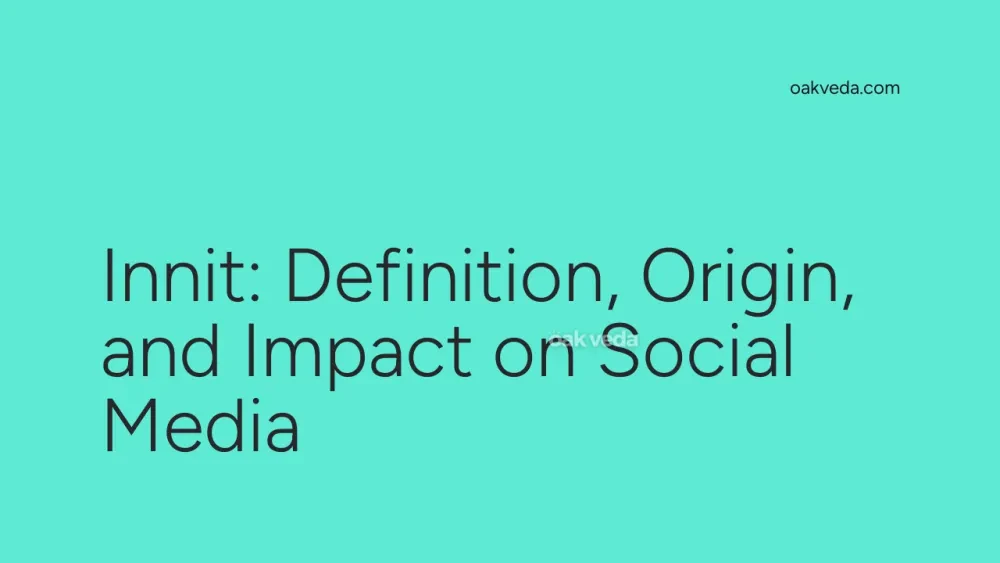
What is "Innit"?
"Innit" is a popular British slang term that has found its way into social media conversations worldwide. Essentially, it's a contraction of the phrase "isn't it" or "is it not." This versatile expression serves multiple purposes in casual communication, primarily as a tag question or a way to seek confirmation or agreement from the listener.
Origin and Development of "Innit"
The origins of "innit" can be traced back to Cockney rhyming slang, a form of coded language that originated in the East End of London. In this linguistic tradition, phrases are often replaced with rhyming words or expressions. "Innit" evolved as a shortened form of "isn't it," which rhymes with "init" or "initiate."
Over time, the use of "innit" spread beyond its Cockney roots and became a common feature of British English, particularly in urban areas. Its popularity grew steadily throughout the late 20th and early 21st centuries, eventually finding its way into popular culture through music, television, and film.
How "Innit" Works in Social Media Communication
On social media platforms, "innit" serves several functions:
-
Seeking confirmation: Users often add "innit" to the end of a statement to turn it into a question. For example, "The weather's awful today, innit?"
-
Creating familiarity: The term helps establish a casual, friendly tone in online conversations.
-
Expressing agreement: Sometimes, "innit" is used as a standalone response to show agreement with a previous statement.
-
Filler word: In some cases, it's used as a filler, similar to "you know" or "right?"
Popular Examples of "Innit" on Social Media
The versatility of "innit" has led to its widespread use across various social media platforms. Here are some common examples:
- "Just finished binge-watching that new series, proper good innit?"
- "Monday mornings are the worst, innit?"
- "New phone, who dis? Joking, innit!"
- "That meme's gone viral, innit?"
Impact of "Innit" on Social Media Culture
The proliferation of "innit" on social media has had several notable impacts:
-
Globalization of British slang: Non-British users have adopted the term, spreading its usage beyond its original cultural context.
-
Informal tone: "Innit" contributes to the casual, conversational nature of social media communication.
-
Cultural exchange: The term's popularity has sparked interest in other British slang expressions and cultural nuances.
-
Meme culture: "Innit" has become a staple in memes and humorous content, often used to parody British speech or culture.
Controversies Surrounding "Innit"
While "innit" has gained widespread popularity, it's not without controversy:
-
Language purists: Some argue that the use of "innit" represents a degradation of proper English.
-
Cultural appropriation: There's debate about the appropriateness of non-British people using the term.
-
Class associations: In the UK, "innit" is sometimes associated with working-class speech, leading to discussions about classism in language use.
How Brands and Influencers Use "Innit"
Savvy brands and influencers have recognized the power of "innit" to connect with audiences:
-
Relatable content: Using "innit" in social media posts can make brands appear more approachable and in touch with their audience.
-
Targeted marketing: Brands targeting British or youth markets often incorporate "innit" into their messaging.
-
Humor and engagement: Influencers use "innit" to add humor to their content and encourage audience interaction.
Future Trends Related to "Innit"
As social media continues to evolve, so too will the use of "innit":
-
Global spread: We may see increased adoption of "innit" in non-English speaking countries as a "cool" English expression.
-
Evolution of meaning: Like many slang terms, the usage and connotations of "innit" may shift over time.
-
Integration into AI: As AI language models improve, we might see more accurate use of "innit" in chatbots and virtual assistants targeting British English speakers.
FAQs about "Innit"
-
Is "innit" proper English? While not considered standard English, "innit" is widely used in casual British speech and increasingly accepted in informal writing.
-
Can I use "innit" if I'm not British? There's no strict rule against it, but be aware that it might sound unnatural if not used in the right context.
-
Is "innit" only used at the end of sentences? While it's most commonly used as a tag question at the end of sentences, "innit" can also be used as a standalone response.
-
Does "innit" have different meanings in different contexts? The core meaning remains the same, but the tone and implication can vary depending on the context and how it's used.
-
Is "innit" used in formal communication? Generally, no. "Innit" is considered very informal and is not appropriate for formal writing or speech.
In conclusion, "innit" has evolved from its Cockney origins to become a ubiquitous feature of British English and, increasingly, global social media communication. Its versatility and informality make it a powerful tool for creating a sense of familiarity and engagement in online interactions. As social media continues to shape language use, it's likely that "innit" will remain a significant part of digital communication culture, innit?
You may be interested in:
- CapCut: Definition, Origin, and Impact on Social Media
- Viral: Definition, Origin, and Impact on Social Media
- Linktree: Definition, Origin, and Impact on Social Media
- Retweet: Definition, Origin, and Impact on Social Media
- Ick: Definition, Origin, and Impact on Social Media Culture
- Retargeting: Definition, Origin, and Impact on Social Media

